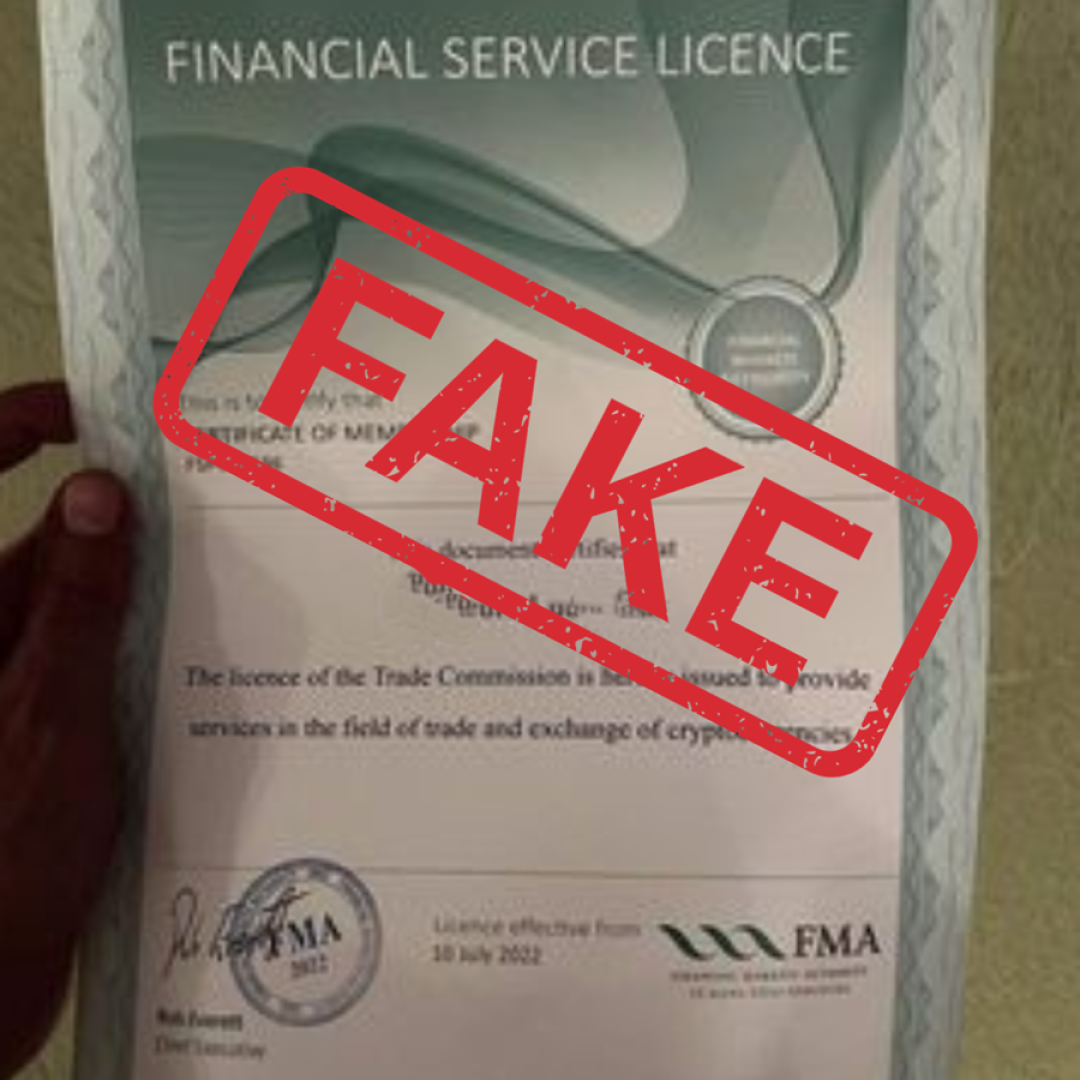Illegal Circulation of Counterfeit FMA License Certificates Detected

Author: Financial Markets Authority
A surge in reports has brought attention to a concerning trend involving the circulation of fraudulent Financial Markets Authority (FMA) license certificates. Individuals are employing these fake licenses to persuade unsuspecting individuals to invest their money with sham investment brokers. Among the cases reported, the name of a legitimate New Zealand-based entity, Collinson Crowdfunding Limited, has been misused in attempts to deceive potential investors.
Impersonating a Legit Brand
Collinson Crowdfunding Limited, a licensed entity for operating a crowdfunding service, has been wrongly associated with these deceptive activities. It is crucial to note that Collinson Crowdfunding is not involved in any fraudulent practices. Complaints reveal that communication with the counterfeit licensees has primarily occurred through the messaging app Telegram.
Verification Tips:
To safeguard against falling victim to such scams, individuals are advised to verify the authenticity of license certificates through the following methods:
- Check the Financial Service Providers (FSP) Register here to ensure the license holder is listed. Verify that the FSP number, entity/license holder's name, and the registered/licensed service type match the information on the certificate.
- Many FSP and license holders are New Zealand-registered companies, with their details available on the Companies Register. However, exercise caution and do not use the contact details provided on the certificate; instead, independently verify them.
- If contact details are absent from the Companies Register, search for the company/license holder's website online. New Zealand company websites typically end with .co.nz but may have other domain names.
Caution and Prevention
We urge readers to share this warning with friends and family, especially on social media platforms, to protect others from falling prey to these deceptive practices.
Below is an image of one of these fake license certificates. All incidents reported so far involve similar-looking certificates, with only the name of the license holder changed.
We recommend caution when dealing with any person or entity that provides you with a licence certificate such as this.

This article is published in collaboration with the Financial Markets Authority
Report a Scam!

Have you fallen for a hoax, bought a fake product? Report the site and warn others!
Scam Categories
Help & Info
Popular Stories
As the influence of the internet rises, so does the prevalence of online scams. There are fraudsters making all kinds of claims to trap victims online - from fake investment opportunities to online stores - and the internet allows them to operate from any part of the world with anonymity. The ability to spot online scams is an important skill to have as the virtual world is increasingly becoming a part of every facet of our lives. The below tips will help you identify the signs which can indicate that a website could be a scam. Common Sense: Too Good To Be True When looking for goods online, a great deal can be very enticing. A Gucci bag or a new iPhone for half the price? Who wouldn’t want to grab such a deal? Scammers know this too and try to take advantage of the fact. If an online deal looks too good to be true, think twice and double-check things. The easiest way to do this is to simply check out the same product at competing websites (that you trust). If the difference in prices is huge, it might be better to double-check the rest of the website. Check Out the Social Media Links Social media is a core part of ecommerce businesses these days and consumers often expect online shops to have a social media presence. Scammers know this and often insert logos of social media sites on their websites. Scratching beneath the surface often reveals this fu
So the worst has come to pass - you realise you parted with your money too fast, and the site you used was a scam - what now? Well first of all, don’t despair!! If you think you have been scammed, the first port of call when having an issue is to simply ask for a refund. This is the first and easiest step to determine whether you are dealing with a genuine company or scammers. Sadly, getting your money back from a scammer is not as simple as just asking. If you are indeed dealing with scammers, the procedure (and chance) of getting your money back varies depending on the payment method you used. PayPal Debit card/Credit card Bank transfer Wire transfer Google Pay Bitcoin PayPal If you used PayPal, you have a strong chance of getting your money back if you were scammed. On their website, you can file a dispute within 180 calendar days of your purchase. Conditions to file a dispute: The simplest situation is that you ordered from an online store and it has not arrived. In this case this is what PayPal states: "If your order never shows up and the seller can't provide proof of shipment or delivery, you'll get a full refund. It's that simple." The scammer has sent you a completely different item. For example, you ordered a PlayStation 4, but instead received only a Playstation controller. The condition of the item was misrepresented on the product page. This could be the